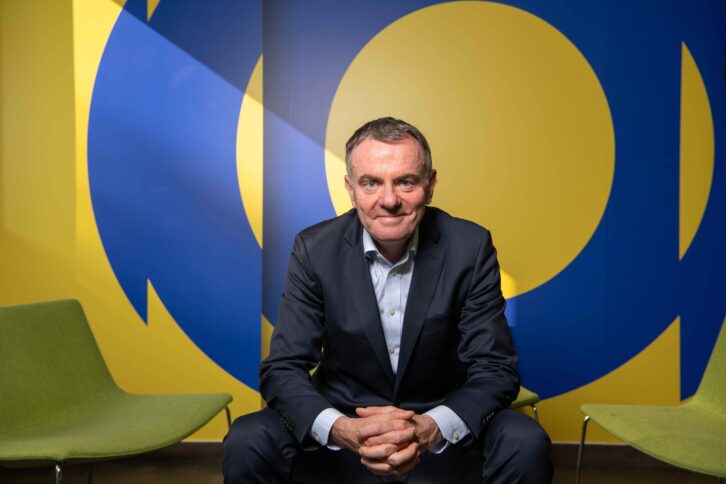While the core mandate of the European Broadcasting Union (EBU), to defend and promote public service media, remains steadfast, the organisation itself has undergone a dramatic transformation since it first launched in 1950. “It started out as a very old-fashioned international organisation,” explains Noel Curran, the EBU’s director-general. “Now, it’s a more dynamic, agile organisation providing a much broader range of services, and it’s much more vocal.”
The EBU’s importance extends beyond public service media, serving as a critical unifier for the entire European broadcasting industry. “Within Europe, what we are realising more and more is, while we think we’re big, we’re actually quite small,” says Curran. This awareness has helped foster a growing imperative for collaboration, not just among public service broadcasters, but also with the commercial sector.

“We will always have flashpoints and things we disagree on, but I think we are all in Europe beginning to realise that there is a common challenge which is significantly greater than us in size, and that we need to work closer together,” he states. This shared understanding of an external threat, particularly around the scale and influence of big tech, is a driving force behind the EBU’s collaborative efforts as it aims to act as a crucial facilitator, opening doors for communication and cooperation that would otherwise be difficult to achieve.
Looking back at the EBU’s biggest achievement over its 75-year history, Curran points to the organisation’s unwavering commitment to defending and promoting public service media. Beyond that, the EBU has been crucial in fostering an environment where leaders, often insular due to the intense national pressures they face, can look beyond their borders.
“As the head of a public service media organisation, you’re in the middle of everything, usually storms and controversies, and you can become a bit insular,” he says. “The EBU’s achievement is to open people’s minds to what is happening elsewhere, collaborate, communicate, learn, and work together. I think that’s very special.”
A challenging political and technological landscape
Since his appointment in 2017, Curran’s role has mirrored the EBU’s expanding scope, as it offers a much broader range of services, encompassing content, technology, AI, and legal aspects, all of which have impacted his responsibilities. The relationship with technology and big tech, particularly with the rise of AI, has become a significantly larger part of the EBU’s work.
Perhaps the most notable change has been the increase in political pressure on public service media across Europe (and beyond). “When I joined, 40 to 50 per cent of my travel was to do with policy, either in relation to political parties or regulation,” Curran states. “Now the vast majority of my travel is to meet governments and regulators. It’s to help broadcasters who are in some difficulties and facing political pressure.”
The EBU also actively works with a wide array of international organisations, from the World Broadcasting Union and the United Nations to commercial broadcasters and journalism advocacy groups like Reporters Without Borders. “It’s one of the most fascinating elements of the job for me, but it also shows how organisations want to work together more and more. How do we achieve scale of impact? That’s why we’re talking to each other much more than we did previously.”
In recent years, broadcasters are widening their impact and saving costs by sharing content, pooling research and development, collaborating on innovative projects, and undertaking co-productions. This collective approach also provides a “much stronger voice when it is a unified voice in Brussels and even nationally,” says Curran.
Asked about the main challenges facing public service broadcasters today, Curran cites increasing political pressure and the overwhelming influence of big tech. “We see that right around Europe, and that is problematic and dangerous.” Regarding big tech, he explains, “we need to work with them, but also we need to find ways of making sure that what they do is not detrimental to public service media and to culture and business in Europe.”
Despite these challenges, public service media maintains a critical advantage: “Trust is our lifeblood. It’s core to what we do,” Curran says. “In 91 per cent of European countries, public service media is the most trusted media, and we shouldn’t lose sight of that or be complacent about it. We need to show our independence, impartiality, transparency and be prepared to put our hands up when we make mistakes.
“Infallibility is never a virtue that I have claimed for public service media. We will make mistakes, and it’s important that we own those mistakes and learn from them, but we shouldn’t feel that public service media has fallen off some trust cliff. It hasn’t.
Even in times of crisis, younger audiences turn to public service media, demonstrating that trust is earned and must never be taken for granted. “If you’re complacent, you lose it, and it’s very hard to get it back when you lose it,” Curran warns.
Leading the way in technology
The EBU’s role in technology continues to be important in a world where change, particularly in areas like generative AI, is moving at a spectacular pace. It serves as a vital reference point for members, allowing them to understand what others are doing, learn from successes and failures, and find opportunities for collaboration. “A lot of our members feel they’re too small to really have an impact. So I think all of those things just show how important it is to have a central reference point, and that’s the EBU. We are that reference point for the members.”
While the EBU isn’t a regulator, it plays a crucial role in shaping the technological landscape by working on approaches and standards. It also advocates for key issues like prominence and transparency, helping regulators craft effective policies.
The EBU Academy is a great example of this commitment, with its School of AI seeing extraordinary success since its launch last year, with over 1,000 individuals completing the programme. “Training is the absolute bedrock of that for us and for all our members. It’s about shared experiences across the members on a range of different topics. EBU Academy is growing in terms of impact and influence, and I fully support that. I see it developing even further in the years ahead.
Talking of the future, Curran’s current seven-year term as director-general is due to end in 2028. While he stresses he has no plans to step down, he does have aspirations for the future of the organisation. “I would hope that the EBU will have strengthened public service media by helping the members transform themselves, and by bringing the members together,” he says.
“The EBU has changed fundamentally as an organisation. We are much more agile, much more responsive, much more dynamic. We offer a much broader range of services, and that’s down to everybody in the EBU who has instituted that change.”
While Curran says it’s “a bit early for me on the legacy front,” his vision for a stronger, more collaborative, and resilient public service media in Europe is clear.







